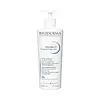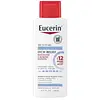What's inside
What's inside
 Key Ingredients
Key Ingredients

 Benefits
Benefits

 Concerns
Concerns

 Ingredients Side-by-side
Ingredients Side-by-side

Water
Skin ConditioningGlycerin
HumectantParaffinum Liquidum
EmollientHelianthus Annuus Seed Oil
EmollientBehenyl Alcohol
EmollientSucrose Stearate
EmollientCanola Oil
EmollientHydroxyethyl Acrylate/Sodium Acryloyldimethyl Taurate Copolymer
Emulsion StabilisingPentylene Glycol
Skin ConditioningBeta-Sitosterol
Emulsion StabilisingXylitol
HumectantZinc Gluconate
Skin ConditioningAcrylates/C10-30 Alkyl Acrylate Crosspolymer
Emulsion StabilisingPalmitamide Mea
1,2-Hexanediol
Skin ConditioningCaprylyl Glycol
EmollientSodium Citrate
BufferingMannitol
HumectantRhamnose
HumectantSodium Lauroyl Lactylate
EmulsifyingSodium Hydroxide
BufferingPolysorbate 60
EmulsifyingSorbitan Isostearate
EmulsifyingTocopherol
AntioxidantPhytosphingosine
Skin ConditioningCeramide NP
Skin ConditioningEthylhexylglycerin
Skin ConditioningCeramide AP
Skin ConditioningCholesterol
EmollientCarbomer
Emulsion StabilisingXanthan Gum
EmulsifyingFructooligosaccharides
HumectantCaprylic/Capric Triglyceride
MaskingLaminaria Ochroleuca Extract
Skin ConditioningCitric Acid
BufferingCeramide EOP
Skin ConditioningWater, Glycerin, Paraffinum Liquidum, Helianthus Annuus Seed Oil, Behenyl Alcohol, Sucrose Stearate, Canola Oil, Hydroxyethyl Acrylate/Sodium Acryloyldimethyl Taurate Copolymer, Pentylene Glycol, Beta-Sitosterol, Xylitol, Zinc Gluconate, Acrylates/C10-30 Alkyl Acrylate Crosspolymer, Palmitamide Mea, 1,2-Hexanediol, Caprylyl Glycol, Sodium Citrate, Mannitol, Rhamnose, Sodium Lauroyl Lactylate, Sodium Hydroxide, Polysorbate 60, Sorbitan Isostearate, Tocopherol, Phytosphingosine, Ceramide NP, Ethylhexylglycerin, Ceramide AP, Cholesterol, Carbomer, Xanthan Gum, Fructooligosaccharides, Caprylic/Capric Triglyceride, Laminaria Ochroleuca Extract, Citric Acid, Ceramide EOP
Water
Skin ConditioningGlycerin
HumectantHydrogenated Coco-Glycerides
EmollientIsopropyl Palmitate
EmollientTriisostearin
Skin ConditioningStearyl Alcohol
EmollientLaureth-9
EmulsifyingPalmitic Acid
EmollientStearic Acid
CleansingDistarch Phosphate
AbsorbentDimethicone
EmollientGlyceryl Stearate
EmollientCetyl Alcohol
EmollientPEG-100 Stearate
Sorbitan Stearate
EmulsifyingArginine Hcl
Skin ConditioningTocopherol
AntioxidantCeramide NP
Skin ConditioningSodium Citrate
BufferingCitric Acid
BufferingMyristic Acid
CleansingArachidic Acid
CleansingOleic Acid
EmollientBenzyl Alcohol
PerfumingPentylene Glycol
Skin ConditioningEthylhexylglycerin
Skin ConditioningTrans-2-Tert-Butylcyclohexanol
PerfumingMenthoxypropanediol
MaskingCarbomer
Emulsion StabilisingSodium Hydroxide
BufferingTrisodium EDTA
Water, Glycerin, Hydrogenated Coco-Glycerides, Isopropyl Palmitate, Triisostearin, Stearyl Alcohol, Laureth-9, Palmitic Acid, Stearic Acid, Distarch Phosphate, Dimethicone, Glyceryl Stearate, Cetyl Alcohol, PEG-100 Stearate, Sorbitan Stearate, Arginine Hcl, Tocopherol, Ceramide NP, Sodium Citrate, Citric Acid, Myristic Acid, Arachidic Acid, Oleic Acid, Benzyl Alcohol, Pentylene Glycol, Ethylhexylglycerin, Trans-2-Tert-Butylcyclohexanol, Menthoxypropanediol, Carbomer, Sodium Hydroxide, Trisodium EDTA
 Reviews
Reviews

Ingredients Explained
These ingredients are found in both products.
Ingredients higher up in an ingredient list are typically present in a larger amount.
Carbomer is a polymer of acrylic acid. Its main role is to create a gel consistency.
A high amount of carbomer can cause pilling or balling up of products. Don't worry, most products contain 1% or less of carbomer.
Ceramide NP is a type of ceramide and formally known as ceramide 3.
Ceramides are intercellular lipids naturally found in our skin that bonds dead skin cells together to create a barrier. They are known for their ability to hold water and thus are a great ingredient for dry skin.
Ceramides are an important building block for our skin barrier. A stronger barrier helps the skin look more firm and hydrated. By bolstering the skin ceramides act as a barrier against irritating ingredients. This can help with inflammation as well.
If you would like to eat ceramides, sweet potatoes contain a small amount.
Read more about other common types of ceramides here:
Ceramide AP
Ceramide EOP
Citric Acid is an alpha hydroxy acid (AHA) naturally found in citrus fruits like oranges, lemons, and limes.
Like other AHAs, citric acid can exfoliate skin by breaking down the bonds that hold dead skin cells together. This helps reveal smoother and brighter skin underneath.
However, this exfoliating effect only happens at high concentrations (20%) which can be hard to find in cosmetic products.
Due to this, citric acid is usually included in small amounts as a pH adjuster. This helps keep products slightly more acidic and compatible with skin's natural pH.
In skincare formulas, citric acid can:
While it can provide some skin benefits, research shows lactic acid and glycolic acid are generally more effective and less irritating exfoliants.
Most citric acid used in skincare today is made by fermenting sugars (usually from molasses). This synthetic version is identical to the natural citrus form but easier to stabilize and use in formulations.
Read more about some other popular AHA's here:
Learn more about Citric AcidEthylhexylglycerin (we can't pronounce this either) is commonly used as a preservative and skin softener. It is derived from glyceryl.
You might see Ethylhexylglycerin often paired with other preservatives such as phenoxyethanol. Ethylhexylglycerin has been found to increase the effectiveness of these other preservatives.
Glycerin is already naturally found in your skin. It helps moisturize and protect your skin.
A study from 2016 found glycerin to be more effective as a humectant than AHAs and hyaluronic acid.
As a humectant, it helps the skin stay hydrated by pulling moisture to your skin. The low molecular weight of glycerin allows it to pull moisture into the deeper layers of your skin.
Hydrated skin improves your skin barrier; Your skin barrier helps protect against irritants and bacteria.
Glycerin has also been found to have antimicrobial and antiviral properties. Due to these properties, glycerin is often used in wound and burn treatments.
In cosmetics, glycerin is usually derived from plants such as soybean or palm. However, it can also be sourced from animals, such as tallow or animal fat.
This ingredient is organic, colorless, odorless, and non-toxic.
Glycerin is the name for this ingredient in American English. British English uses Glycerol/Glycerine.
Learn more about GlycerinPentylene glycol is typically used within a product to thicken it. It also adds a smooth, soft, and moisturizing feel to the product. It is naturally found in plants such as sugar beets.
The hydrophilic trait of Pentylene Glycol makes it a humectant. As a humectant, Pentylene Glycol helps draw moisture from the air to your skin. This can help keep your skin hydrated.
This property also makes Pentylene Glycol a great texture enhancer. It can also help thicken or stabilize a product.
Pentylene Glycol also acts as a mild preservative and helps to keep a product microbe-free.
Some people may experience mild eye and skin irritation from Pentylene Glycol. We always recommend speaking with a professional about using this ingredient in your routine.
Pentylene Glycol has a low molecular weight and is part of the 1,2-glycol family.
Learn more about Pentylene GlycolSodium Citrate is the sodium salts of citric acid. In skincare, it is used to alter pH levels and acts as a preservative.
Its main functions are to maintain the pH of a product and neutralize metal ions.
The acidity of our skin is maintained by our glands and skin biome; normal pH level of skin is slightly acidic (~4.75-5.5).
Being slightly acidic allows our skin to create an "acid mantle". This acid mantle is a thin barrier that protects our skin from bacteria and contaminants.
Learn more about Sodium CitrateSodium Hydroxide is also known as lye or caustic soda. It is used to adjust the pH of products; many ingredients require a specific pH to be effective.
In small amounts, sodium hydroxide is considered safe to use. However, large amounts may cause chemical burns due to its high alkaline.
Your skin has a natural pH and acid mantle. This acid mantle helps prevent harmful bacteria from breaking through. The acid mantle also helps keep your skin hydrated.
"Alkaline" refers to a high pH level. A low pH level would be considered acidic.
Learn more about Sodium HydroxideTocopherol (also known as Vitamin E) is a common antioxidant used to help protect the skin from free-radicals and strengthen the skin barrier. It's also fat soluble - this means our skin is great at absorbing it.
Vitamin E also helps keep your natural skin lipids healthy. Your lipid skin barrier naturally consists of lipids, ceramides, and fatty acids. Vitamin E offers extra protection for your skin’s lipid barrier, keeping your skin healthy and nourished.
Another benefit is a bit of UV protection. Vitamin E helps reduce the damage caused by UVB rays. (It should not replace your sunscreen). Combining it with Vitamin C can decrease sunburned cells and hyperpigmentation after UV exposure.
You might have noticed Vitamin E + C often paired together. This is because it is great at stabilizing Vitamin C. Using the two together helps increase the effectiveness of both ingredients.
There are often claims that Vitamin E can reduce/prevent scarring, but these claims haven't been confirmed by scientific research.
Learn more about TocopherolWater. It's the most common cosmetic ingredient of all. You'll usually see it at the top of ingredient lists, meaning that it makes up the largest part of the product.
So why is it so popular? Water most often acts as a solvent - this means that it helps dissolve other ingredients into the formulation.
You'll also recognize water as that liquid we all need to stay alive. If you see this, drink a glass of water. Stay hydrated!
Learn more about Water